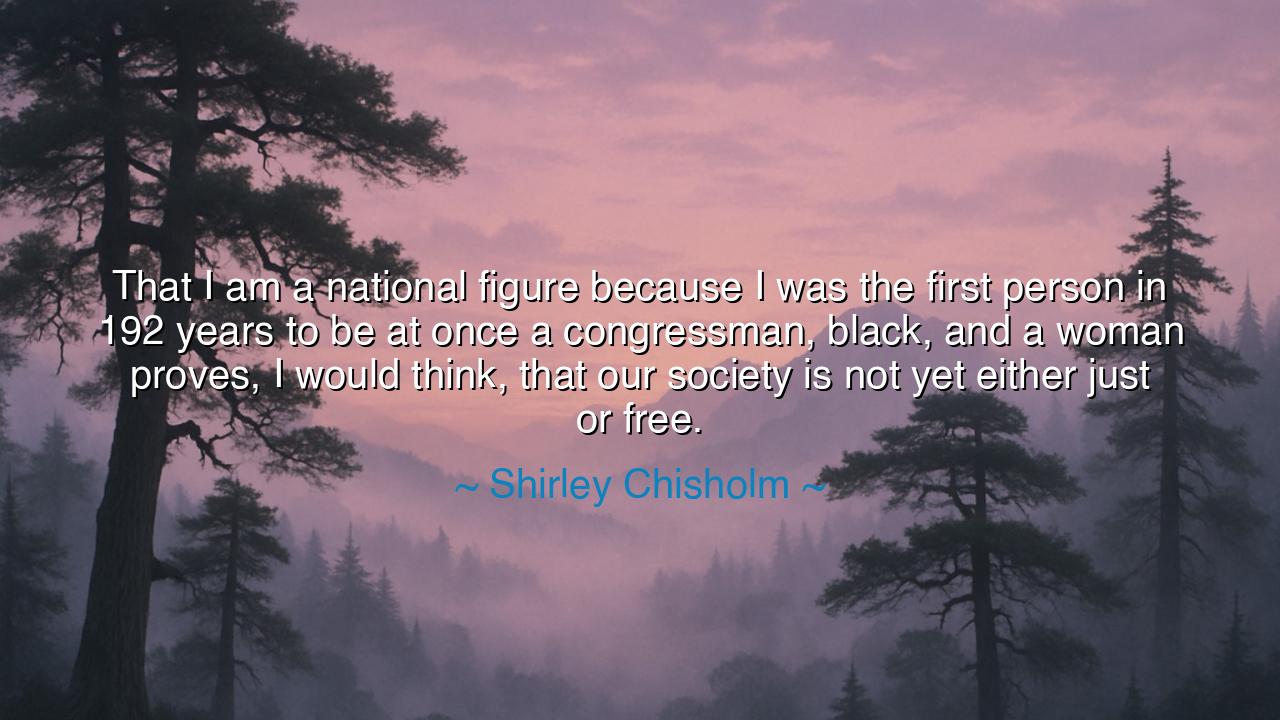
That I am a national figure because I was the first person in 192
That I am a national figure because I was the first person in 192 years to be at once a congressman, black, and a woman proves, I would think, that our society is not yet either just or free.






Hear the resounding words of Shirley Chisholm, a pioneer whose voice still shakes the walls of complacency: “That I am a national figure because I was the first person in 192 years to be at once a congressman, black, and a woman proves, I would think, that our society is not yet either just or free.” These are not the words of boast, but of lament and revelation. For Chisholm, though she stood in triumph, knew her very uniqueness was an indictment against the nation she served. Where there should have been many, there was one. Where there should have been justice, there was delay. Where there should have been equality, there was silence.
The origin of her truth lies in the long shadow of American history. For nearly two centuries after the founding of the Republic, the halls of Congress rang only with the voices of white men. Slavery had long since fallen, yet its spirit lived on in barriers and exclusions. Women had won the right to vote, but their hands were still pushed away from the levers of power. Chisholm’s election in 1968, then, was not simply the rise of an individual, but the breaking of a dam, the first crack in a wall that should never have been built.
Consider the courage it took. In her campaign, she faced not only the opposition of political rivals, but the skepticism of her own allies. Many said a black woman could not win, that her voice was too different, her presence too strange for the halls of power. Yet Chisholm, with fire in her heart, declared, “Unbought and unbossed.” She entered Congress not as a token, but as a warrior, determined to carry the voices of the poor, the marginalized, and the forgotten into a chamber that had long ignored them. Her story is a living example of the truth in her words: society called her a “first” not because progress was swift, but because justice had been so long denied.
Her quote is both triumphant and tragic. Triumphant, because it marks the arrival of a woman who would not bend to the chains of history. Tragic, because it confesses that such a moment should not have been extraordinary, but ordinary. A just society would not marvel at the sight of a black woman in Congress—it would expect her presence, honor her contribution, and multiply her numbers. That the nation was stunned into recognition reveals how far it still was, and still is, from true freedom.
Yet, Chisholm’s voice is not only a critique—it is a summons. She reminds us that freedom is not proven by words in a constitution, but by the faces who walk the halls of power. It is not declared once and sealed forever; it must be built again and again, with every generation daring to demand more than the last. Chisholm showed us that barriers can fall, but also that they will not fall of their own weight—they must be struck down by courage, persistence, and the unyielding cry for justice.
The lesson is this: if you find yourself the first, know that your achievement is both a victory and a mirror. A victory, because you have opened a path where none existed. A mirror, because your rarity reveals the work still undone. Do not grow content with being the only; instead, labor until you are the first of many. And if you find yourself in a place where diversity is absent, do not say, “It must be this way,” but rather, “Why not more? Why not now?” For justice delays only when people accept delay.
What then shall you do? In your life, challenge every space that is closed to others. Ask who is missing, and fight for their place at the table. Speak not only for yourself, but for those whose voices are still silenced. Celebrate the pioneers, but do not stop at celebrating—become a pioneer yourself, in whatever field you walk. And above all, remember the truth of Chisholm’s words: a society is not just or free until all its people can rise, not as exceptions, but as equals.
So let her words echo in your heart: congressman, black, woman, society, just, free. They are not relics of the past, but living commands to the present. Stand where barriers remain, and break them. Walk where doors are closed, and open them. Speak where silence reigns, and shatter it. For the freedom of one is not complete until it is the freedom of all—and only then shall society be both just and free.






AAdministratorAdministrator
Welcome, honored guests. Please leave a comment, we will respond soon